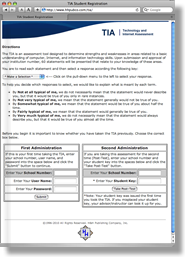The TIA is administered online in about 20-30 minutes. Immediately upon completion of the assessment by the student, a two-page report is displayed listing the percentile scores for each scale along with suggestions for improving each area. Administrators of the TIA can view previously administered results as well as the status of their institution’s account at any time on the Web. A detailed User’s Manual is provided at no charge with each order. It includes an overview of the TIA, a description of the eight scales, normative and reliability data, and directions for administrators.
The Technology and Internet Assessment (TIA) is a nationally normed, valid and reliable, self-assessment of computer literacy skills. The TIA is designed to determine strengths and weaknesses related to a basic understanding of computer, Internet, and information technology skills. The TIA focuses on eight areas that present barriers for individuals seeking employment and for those striving to succeed in our educational system. The results can be used to provide baseline information for academic instructors and counselors, workplace trainers, and social service professionals. The TIA was developed in response to the growing need to assess the technology skills that are critical for workplace and academic success.
TIA is designed to:
- Provide individuals taking the measure with valuable feedback about each scale, what it measures, their individual scores, and suggestions for ways they can improve each area;
- Identify areas in which adult learners need assistance in learning and working with technology;
- Serve as an evaluation tool to assess the degree of success of programs or courses;
- Help educators identify computer literacy strengths and weaknesses of individuals and groups;
- Provide workers and students with an understanding of the basic technology skills required for workplace and academic success;
- Provide baseline information for academic instructors and counselors, workplace trainers, and social service professionals;
- Provide pre/post achievement measure for individuals participating in programs or courses focusing on improvement of basic computer, Internet, and information skills.

Authors
The TIA was developed by Michael Ealy.
Specific Computer Skills
This scale measures a person’s understanding of computer terminology, application programs, file management, and disk management. Individuals who score low on this scale need training and experience to master these basic skills. With an understanding of the basics, computer skills will be transferable from one program to another and from one operating system to another. Students and employees who have mastered these basics will be able to adjust to and learn new technologies more quickly.
Acquisition of Technical Knowledge
This scale measures an individual’s understanding of how, why, and where to acquire information about new technology. Students and workers alike must take responsibility to become thoughtful learners. Those who score low on this scale should seek out new ways of acquiring technical knowledge. Sources include instructors, books, manuals, magazines, online services, classmates, co-workers, classes, etc.
Basic Internet Knowledge
This scale measures a person’s understanding of the basics of the Internet, including how to search for information, retrieve and download files, send e-mail, browse websites, and participate in online mailing lists and newsgroups. Low scores indicate deficiencies in one or all of these areas. Exercises designed to encourage searching, browsing, and communicating via e-mail will help individuals master the basics.
Internet Information Skills
This scale provides feedback on a person’s ability to make critical judgments about the value, reliability, and validity of the information they find on the Internet. Those with low scores should be taught how and why to scrutinize information. Developing these skills will help individuals become critical thinkers and analyzers of information from a variety of sources.
Adapting to Technological Change
This scale measures an individual’s level of comfort with frequent or major changes in technology. People with low scores are less likely to be able to adapt to changes in technology. An individual who is unable to adapt will likely cling to old technologies and may have difficulty passing a course, advancing in the workplace, or even maintaining employment. Asking questions and participating in conversations about technological change will help to overcome fears.
Impact of Technology
This scale measures an individual’s understanding of how technology will impact the workplace, environment,and society now and in the future. Those who score low should be encouraged to become involved in classroom or workplace discussions about how technology will affect our lives. Knowledge of how technology will impact the future will help students and workers get ahead.
Ethics in Technology
This scale provides insight into a person’s ability to discern ethical behavior. Individuals who receive low scores need to be taught the value of practicing ethical behavior. Students and employees should be able to recognize the difference between ethical and unethical conduct and understand why ethical behavior is beneficial. Discussions that focus on what constitutes a breach of confidentiality are important. There are a variety of resources, both printed and online, that provide guidelines for ethical use of technology.
TIA Scales
- Use of Technology
- Specific Computer Skills
- Acquisition of Technical Knowledge
- Basic Internet Knowledge
- Internet Information Skills
- Adapting to Technological Change
- Impact of Technology
- Ethics in Technology
Prices
- $5.00 each, 200+ $4.50 each
- There is a $4.50 Account Set-Up/Update Fee per order.
- Regular-Priced Assessments and Online Courses expire two years from date of purchase.
User’s Manual



